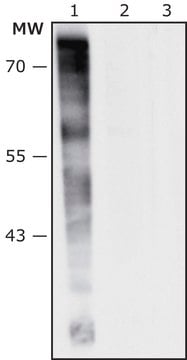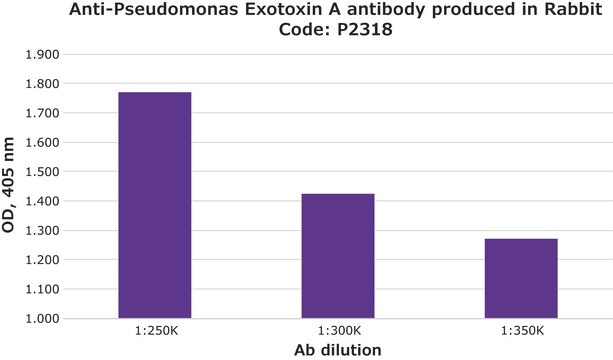SAB4200871
Anti-Pseudomonas aeruginosa Exotoxin A antibody, Mouse monoclonal
clone EXO-68, purified from hybridoma cell culture
Synonyme(s) :
ETA, PE, Pseudomonas Exotoxin A
About This Item
Produits recommandés
Forme d'anticorps
purified from hybridoma cell culture
Niveau de qualité
Clone
EXO-68
Forme
liquid
Espèces réactives
Pseudomonas aeruginosa
Concentration
~1 mg/mL
Technique(s)
ELISA: 2.5-5 μg/mL using Exotoxin A from Pseudomonas aeruginosa for coating.
immunoblotting: 0.125-0.25 μg/mL using exotoxin A from Pseudomonas aeruginosa.
Isotype
IgM
Température de stockage
−20°C
Modification post-traductionnelle de la cible
unmodified
Description générale
Spécificité
Application
Actions biochimiques/physiologiques
Forme physique
Stockage et stabilité
Clause de non-responsabilité
Code de la classe de stockage
12 - Non Combustible Liquids
Classe de danger pour l'eau (WGK)
nwg
Point d'éclair (°F)
Not applicable
Point d'éclair (°C)
Not applicable
Certificats d'analyse (COA)
Recherchez un Certificats d'analyse (COA) en saisissant le numéro de lot du produit. Les numéros de lot figurent sur l'étiquette du produit après les mots "Lot" ou "Batch".
Déjà en possession de ce produit ?
Retrouvez la documentation relative aux produits que vous avez récemment achetés dans la Bibliothèque de documents.
Notre équipe de scientifiques dispose d'une expérience dans tous les secteurs de la recherche, notamment en sciences de la vie, science des matériaux, synthèse chimique, chromatographie, analyse et dans de nombreux autres domaines..
Contacter notre Service technique








